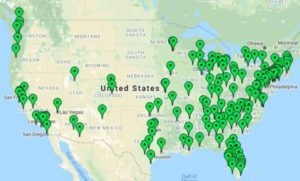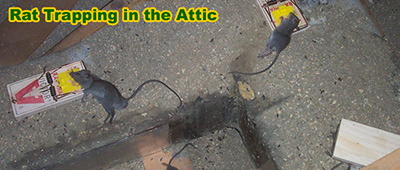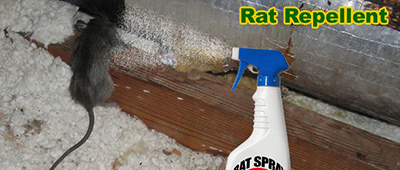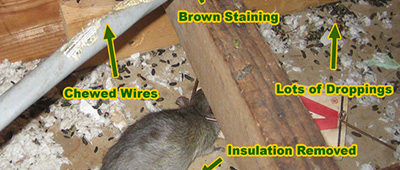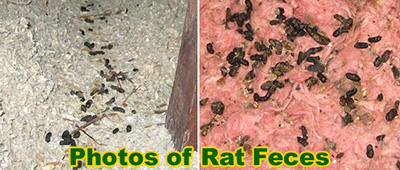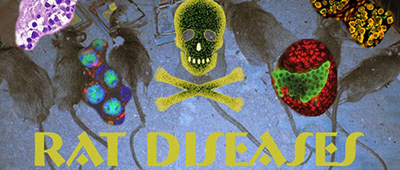Can a pet dog help repel rats? Unfortunately, not really.
It's true that several species of terriers were specifically
bred to catch burrowing rodents, and even rats. Examples
include the Scottish Terrier and the Jack Russell Terrier.
These dogs are actually good at catching rats, if given an
environment to do so. But the problem is that you probably
have rats inside your house, in the attic or walls. Your dog
is of no help there, because the rats are safe in such
enclosed spaces. You might consider letting your dog loose
in the attic, but the rats will easily get away and go down
the walls or other gaps where the dogs can't get them. In
addition, the insulation might not be good for your dog.
Learn how rats communicate using pheromones.
Good rat dogs like the Scottish Terrier and the Jack Russell
Terrier can catch rats in the outdoors. Yes, dogs can kill
rats. So if you have such dogs outside, they may catch a rat
or two and keep the population down. But rats breed very
quickly, and there's no way your dog can make a meaningful
dent in the population.
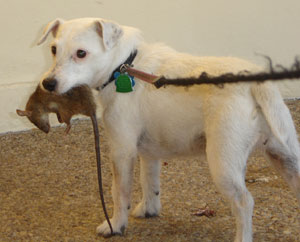
Cats are superior to dogs when it comes to catching rats. But even several pet cats that are skilled hunters will not guarantee to solve a problem with rats in your house. I have been to many rat jobs at households that have many cats, and outdoor cats. Rats are very good survivors, and when they have a house to live in, cats and dogs can't solve the problem.
Do dogs keep rats and mice away?
Hard to think of dogs chasing rats and mice. Right? Well, most people do not relate rat control with dogs. However, you will be surprised to learn that dogs too are as good and fierce with rat and mice control as cats are.
Why would you use a dog instead of a cat?
- While dogs are territorial, cats sometimes have an attitude that seems to suggest that they really do not care what is going on around them. This in essence means if your cat doesn't feel like running around, it simply will not.
- As cats get older, they tend to get less inclined to heavy work and running around, preferring to sleep as long as is possible. Dogs on the other hand, will keep active until they simply can no longer do anything about it.
- Because dogs are loyal, they tend to want to please their owners as much as is possible. This means if you have trained your dog to catch mice and rats in your home, then you are guaranteed to get the results you are looking for.
The truth is any dog can keep rats and mice away. However, how you train them is what determines the final outcome. There isn't a type of a dog that best fits this job; however, you may need to consider a smaller dog that can go into those hard to reach areas where families of rats and mice are hiding hoping they never get caught.
A dog that has been in an animal shelter may desperately want attention and love. These dogs may therefore be easier to train than the typical house trained dog that has had shelter all its life.
A dog that is specifically trained to keep rodents away will also do much better than one that is not trained. Therefore, you must consider training your dog from an early age for this purpose.
How do they keep the rats away?
- Their size intimidates the rats, not to mention the fact that they too can turn predator to rats and mice.
- Their barking can be distressing to rats. Eventually, this 'bugging' causes the rats or mice to simply move homes.
Your dogs will keep rats away; all you need to do is train them to do so. When they know their job well, dogs can outdo the best cat 'mousers'.
Read more about rats:
Do cats keep rats away?
Do rats carry rabies?
Can Rats Chew Through Wires in a Car?
Does car insurance cover rat damage?
What if a rat got inside my house?
Do rats make good pets?
Do dogs keep rats away?
Are rats dangerous to cats, dogs, or other pets?

Email from reader, with dog
There has been either mice or rats or some other rodent in my attic for quite a few months. I live with my son (teenager) who is too scared to go up there I went up approx october after hearing scurrying whilst in bed I didn't see anything. Not even mouse poops. I called the local authority who came out. Left poison in small dishes. Note they don't even go up for health and safety reasons. Just push open the attic access lid. Returned 2 weeks later. Poison had been eaten and lots of mouse droppings he said by them so filled it up again My brother got up there after me ringing him as now I was worried. He put some mouse traps up there. About 4 different types. Came back a wEek later. Nothing in the traps (baited) and I could still here scurrying. I did say I heard specific scratching in one area. There was a dead baby bird. Seemed eaten half eaten. Which he removed. He started to clear it out and an old bag had some bits in the bottom (like chewed). And an extremely strong pee smell and lots of poops. we cleared everything out. This was early december. Teddies. Cards. Cases. Clothes. Anything mice could bury into. Its 3am here now. 4 months later I am hearing something running above my head. All the authority has done is put poison down it keeps getting eaten. My brother has put up more traps but nothing in them. Outside last week. A substantial amount of earth was pushed away under the shed. After seeing it the authority said it was rats. Not mice and that's possibly what might be in the attic. We bought a dog last year. Summertime. Kept outside overnight. Foolishly my husband was leaving it some food out. Also. In my shed. A very strong smell of pee and huge amount od droppings. Further investigation showed they had got into an outside pond fish food supply (chewed thru a bag) as I noticed the droppings were orange. The same colour. This I cleared out totally. Throwing out any cardboard boxes etc. And put traps in. I check them daily. Nothing in them. The dog barks periodically. I've not told my husband never to leave food for the dog in case that was the food supply and he doesn't. It doesn't seem to bark early hours now either. Do dogs kill rats? I have lived here 20 years and never ever seen a mouse or rat in my property. I am extremely clean and clutter free. My garbage is kept inside plastic bins and collected on a weekly basis. I've never seen any mouse droppings or mice inside the house. But the fact that the council have now confirmed rats definitely under the shed is upsetting me and I don't have funds to call an ex terminator who are really expensive here. What is my next step. Please help. My husband is disabled and can't get in the attic. My brother lives a way away and comes once a week. He said it may be a squirrel in my attic. Am now going to purchase rat traps and a squirrel trap. Can rats be caught in a squirrel trap. I am too scared to now get up there!!! Please help!
THE SAME APPLIES TO MOUSE REMOVAL
Although I wrote this site with rats in mind, such as the Roof Rat and Norway Rat, the same principles apply to other rodents, such as the house mouse. Mice behave very similarly to rats, they're just smaller. Do dogs kill mice? Yes, a dog can kill a mouse. But same as with rats, can dogs keep mice away? Not very well, and especially not if mice are inside a building, and inside the attic and walls. Email me if you have any questions about mouse removal, how to remove mice, rodent removal, other queries.Do dogs keep rats away?
Need professional rat help? What does it cost? Go to the home page
Rats often fall prey to dogs - while running around neighborhoods, one of the household pets will get hold of it and usually rip it to shreds. You might think this would be a good thing at first, but when you delve a little further into what might happen, and does happen, you might think twice about letting your furry friends loose at that rodent in your home.
There are no fewer than SIX diseases that rat can pass to dogs, most of which could prove deadly if not diagnosed and treated in time. Even those that might not prove to be fatal could cause long-term damage and pain for your dog, and we are sure that this is something you will want to avoid. That's why we would NEVER recommend using your dog (or any dog) to catch rats. The cons seriously outweigh the pros.
A disease that might be referred to as “lepto”, leptospirosis is a disease transmitted from rats to dogs. The rats will pee everywhere it runs, and this pee can contaminate water that your dog might drink. Your dog might actually investigate the pee, having a little lick for itself. The dog then has the bacteria that causes leptospirosis in its body, and it won't be long before it starts to manifest itself in the dog's kidneys. Initial symptoms might include things such as muscle pain and a fever, and also things that you might not be able to monitor too - depression, tiredness / lethargy, and a loss of appetite. Some pet owners might take a little while to first notice these symptoms, and then take their dog to the vet. In that time, the bacteria will be doing its damage and causing the dog pain.
Rat bite fever is another disease that a rat can pass onto your dog, and this one usually happens when the dog actually comes into contact with the infected rodent. As the name would suggest, it is usually passed on through actual physical contact - something like a scratch or a bite. Dead rodents can also pass on this disease, as can infected matter from urine or feces.
This is a disease that will require treatment with antibiotics, and if not treated, it can also be passed from dogs to humans too.
There are three types of plague that rats can spread, although the chances of you coming across an infected rat is incredibly rare these days. Thankfully too, the introduction of modern medicine eradicating diseases that once took over the world. Septicemic plague, pneumonic plague, and bubonic plague are three diseases that rats can [rarely] pass onto dogs, but roundworms, tularemia (also known as rabbit fever), and toxoplasmosis are pretty common. These disease can be spread when dogs attack rats, and then eat / ingest some of the infected rat material, through drinking water that has been infected / contaminated with rat urine or feces and other biological matter, and even just by sharing food. The latter is in the case of things such as roundworm.
Now that you know about some of these diseases that are quite easily passed from rat to dog, would you really want to put your dog in the firing line? Let's take a peek at a few other things while we're on the subject too. Things like dogs getting their noses, mouths, or paws stuck in rat traps, or dogs that have accidentally become poisoned from eating poisoned food that has been left out for the rats. These are things that commonly happen. It's just another thing to add to the mounting list of reasons why you shouldn't let your dog come anywhere close to a rat, let alone use your dog to try and capture / trap / get rid of them.
Give your pooch a break - the cons outweigh the pros. If you have a dog, and you think you may have rats, get in touch for some free advice, or make the necessary precautions to ensure ALL of your household is safe.
Go back to the Rats in the Attic home page.

More often than not, combatting the threat of a rat infestation becomes a battle of attrition, with the best defensive always being preventative and exclusion methods rather than going down the route of using lethal traps.
The problem with rats is that they are an incredibly hardy species. No matter what environment or situation they are put in, rats will always find a way to survive and thrive by a combination of eating just about everything and their ability to quickly adapt to new surroundings. They are remarkably smart creatures that can easily avoid trapping and seem virtually resistant to every repellant humanity has tried to throw at them.
One of the best strategies homeowners can adopt is preventing rats from being able to access a food or shelter source in the first place, for example, by storing all food in sealed containers, sealing any gaps outside their home, and so on. Some homeowners have even gone on to try and use natural methods by acquiring some furry assistance in the form of a cat.
Most people would be forgiven for thinking cats are excellent at keeping rats away, considering the numerous depictions of them in cartoons. However, in reality, cats do not always make excellent rat-catchers. Most of the time, cats will only hunt other creatures for sport or entertainment, but they tend to avoid rats because of their size relative to other rodents like mice or less-aggressive animals like birds.
Although the smell of a cat can be a useful defense against rats, it may be more beneficial for homeowners to use a dog, or a combination of the two. In fact, dogs have been the go-to used by medieval communities to control rat populations, including farms and large estates.
To start with, cats are very independent creatures that are difficult to tame. Dogs, on the other hand, can be trained to perform a variety of tasks, as evident by the huge variety of dog breeds, almost all of which have been bred for a specific purpose such as hunting.
Also, unlike cats, some breeds of dog like to be active, and are more likely to become aggressive when confronted, whereas a cat will simply run away. But like cats, it all comes down to what breed of dog you get, as some are certainly better at it than others.
Some dogs have actually been bred specifically to catch rats, the most well-known being terriers. They were used in early 20th century England for a sport called rat baiting, in which the dog was pitted against a number of rats and bets were placed on how many rats it could kill over a set period of time. Not only are terriers naturally good against rats, but they can also help remove squirrels. Common breeds used for rat removal include Jack Russell and Cairn terriers.

